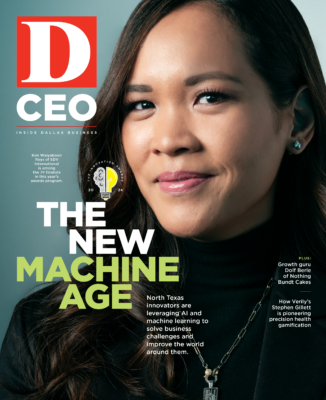It can take up to 800 hours to develop a new skill, such as salespeople who need to learn how to persuade potential customers and overcome objections. Gretta Brooks, a global sales executive with deep experience in the hospitality industry, watched as some companies cut the length of training they provided for various jobs from a few weeks to a few days. She also saw the responsibility of doing the training foisted on people like corporate supervisors, whose strong suits may not have been teaching.

Brooks recognized an opportunity and responded by launching Dallas-based SalesBoost, which offers artificial intelligence-based learning simulations and guarantees that people will develop new behaviors and retain 90 percent of the skills they pick up. The company’s voice-analysis system uses AI to provide instant coaching for soft skills, such as how customer service reps can handle difficult conversations.
“The AI for us is our secret sauce,” said Brooks, who serves as CEO. “With AI, we can provide unbiased and objective feedback to the learner. It’s a big differentiator.”
The new age of AI and machine learning is reminiscent of the level of buzz and activity the region saw in the late 1990s and early 2000s for telecom, networking, and the World Wide Web. So says Dr. Gopal Gupta, computer science professor and co-director of the Center for Applied AI and Machine Learning at The University of Texas at Dallas.
“The internet boom transformed the North Texas business landscape and put Dallas on the high-tech map,” he says. “The growth of high-tech companies in our area has been phenomenal, and today, DFW is in the top five most active areas in the U.S. when it comes to the high-tech industry. We hope the same can happen with the excitement generated by AI and machine learning, and the DFW area can rise even higher.”
AI involves computers and robots mimicking human intelligence and going beyond what people can do. Machine learning is essentially a subset of AI and computer science that “focuses on the use of data and algorithms to imitate the way that humans learn, gradually improving its accuracy,” according to tech pioneer IBM.
The five companies being honored in the 2024 Innovation Awards’ AI and ML category are emblematic of the increasing range of uses that North Texas companies are finding for these technologies (see photos). AdComp Systems Group has developed tech tools for nearly 300 government agencies nationwide. It also created Classy the CourtBot, which uses AI to answer citizens’ legal, procedural, and administrative questions. “We are working on launching many other bots for agencies like utilities, taxes, code compliance, permits, and licensing,” says CEO Mansur Plumber.

By feeding government data into AI and ML engines, these technologies can help citizens better interact with various agencies, he says. “AI will reduce costs and increase efficiency and convenience for all agencies within the government. Access to justice, procedures, and information will become so much easier.”
The company also has a division that develops AI- and ML-based systems to help with business operations for itself and clients. For example, its sales arm uses AI to track prospects, while administrators and accountants employ the technology for better calculations and completing tasks in a fraction of the cost and time. “Creating AI-based solutions for our government clients has directly increased our sales multifold,” Plumber says.
As brainy as AI can be, its work in finding correlations and patterns in data can be made better still if people provide it with things like their intuition and perception. Allen-based Balanced Media | Technology blends intelligence from machines and humans by having video gamers lend a hand.
The company’s co-founder and chief technology officer, Corey Clark, also serves as deputy director of research and faculty at SMU Guildhall, a video game school, and is an assistant professor of computer science in SMU’s Lyle School of Engineering.
In a shoot-’em-up game developed by Balanced, players were tasked with blowing up robots by drawing lines to predict where those robots would be. AI averaged out the human guesses and turned it all into a probability map. A machine learning algorithm used the map to help measure and track age-related macular degeneration, a disease that affects a person’s central vision.
Balanced’s work on this front came through a partnership with SMU and the Retina Foundation of the Southwest. Clark says gamers help with its text-based games, helping find relationships between data that are hard for AI techniques to identify. Additionally, the company uses data from games to remove typos and improve AI’s understanding of various topics. Others that have employed gaming built their games for single uses, Clark says. “The problem with that is it wasn’t scalable,” he says. “We can use the same game to solve multiple problems. That is what makes it scalable and useful.”
A decade ago, Miguel Alonso pioneered work in applying AI to optimize the problem-solving mechanism of telecom networks. “My teams are now working at DZS to take this foundation to a whole new level,” he says. “Moreover, AI is being integrated across industries and transcending products—it’s becoming woven into the fabric of corporate processes to make operations increasingly efficient and customer-centric.”

Alonso, who serves as chief product officer for DZS, says his company and others like it are using AI and automation tools to help solve problems for businesses—and avoid problems altogether. One success story for DZS is TalkTalk, a UK-based internet provider. When customers began calling in about difficulties with Wi-Fi, the company had trouble identifying the source of the problem, be it coverage, interference, or something else. Typically, the customer would have to explain what was happening then go through a long menu of questions to aid TalkTalk in determining what the issue was. At the end of 2022, the company brought in DZS to help. Using its AI-driven Expresse and CloudCheck offerings, TalkTalk can now immediately diagnose and isolate problems and get accurate recommendations for resolving issues. The technologies have helped substantially reduce customer churn, DZS reports.
Ultimately, it’s consumers who can benefit most from new technologies, Alonso says. “AI and machine learning will allow tech and telecom industries to understand their end users far better and craft an unrivaled subscriber experience while reaching new levels of responsiveness and efficiency,” he says.
Another North Texas company, SDV International, is using AI and ML to address a variety of needs for clients that range from government agencies to Fortune 500 companies. Founded in 2008, the company builds AI and ML models that learn and improve over time. This means the technology it creates today will evolve and become more effective down the road, says CEO Kim Waiyaboon Roys.

“AI and ML algorithms are pivotal in analyzing large datasets, helping us derive actionable insights,” she says. “In the national security domain, this means identifying patterns and trends that are crucial for decision-making processes.”
SDV International’s machine learning models can help predict the evolution of social media narratives, identify key influencers, and analyze how different parties contribute to changes across social media networks. The company also uses AI and ML in its research and development.
“We’ve developed several productivity solutions that have improved our delivery by more than 10 times in certain areas over the past couple of years,” Waiyaboon Roys said.
In May, SDV International announced that it received a $249 million contract from the Pentagon’s chief AI office and the U.S. Army. The company is working with the Department of Defense to develop and deploy technologies “that provide critical intelligence, enhance situational awareness, and optimize operational effectiveness,” Waiyaboon Roys says.
And more innovations are on the way, she hints, as SDV International was on pace to strike a new partnership with a major North Texas tech company before 2023 concluded.
AI and machine learning are expected to become even more widespread among North Texas businesses in the coming years. This isn’t surprising in a region known for pioneering new technologies and fostering innovation.

“The Dallas area is vibrant,” says Plumber of AdComp. “Of all the major metropolitan areas in Texas—Houston, Austin, and San Antonio—Dallas-area cities are the friendliest toward adopting new technologies and embracing innovations and change. So, we love to belong to this winning and always advancing region of Texas.”
Also fostering the development of new technologies is the region’s deep college and university infrastructure. “Academic institutions and research organizations within the DFW area will maintain a pivotal role in advancing AI and ML,” says Dr. Suvra Pal, associate professor of statistics at The University of Texas at Arlington.
“Collaborative efforts between academia and industry have the potential to drive the creation of state-of-the-art technologies and innovative solutions,” he says. “Similarly, considering the prominence of healthcare in the DFW area, a rise in the adoption of AI and ML is conceivable for applications in medical research.”
Traditional businesses are getting in on the action, too. AI and machine learning are being used in core functions such as tax and legal and in lines of business. That’s according to Scott Moore, Dallas office managing partner at PwC.
Both AI and generative AI, which produces content such as text, images, and audio, are being used to help gather, summarize, analyze, safeguard, and disseminate data, enabling faster analysis and more data-driven decisions.
“We’re also seeing a focus on stakeholder trust,” Moore says. “AI and ML can automate or augment predictive maintenance, fraud detection, cybersecurity, supply chain oversight, and more. GenAI can boost transparency by helping to summarize, verify, and generate data and reports.”
Experts say AI will create even more opportunities for businesses and professionals in our region. This could come in areas such as automating content creation, personalizing customer experiences, and expediting decision-making.
“I’m excited about the opportunity for North Texas companies when it comes to AI,” says Tim Gross, principal at Deloitte Consulting. “With the caliber of companies that are based here—both established and emerging businesses—and the fact that we’re seeing an uptick in companies relocating to the region, our ecosystem for innovation is strong.”
Various analysts put the market for generative AI at $200 billion by 2032, and that will likely double every two years for the next decade, Gross says. “With the diverse range of companies based in North Texas, our region is set to capitalize on that investment over the next decade,” he says.
For all the promise that AI and ML have in a business context, these pioneering technologies can also be used to fundamentally enhance people’s lives, says Brooks.
“The reason I built SalesBoost is to enhance communication and the ability to be more kind, warm, and human so we reduce the friction we have in our communities,” she says. “What we’re doing is providing the ability for people to be their best versions. If we can all put some thought into how we are communicating and listening, hearing, and resolving issues, I think we will be in a much better place.”
Author








